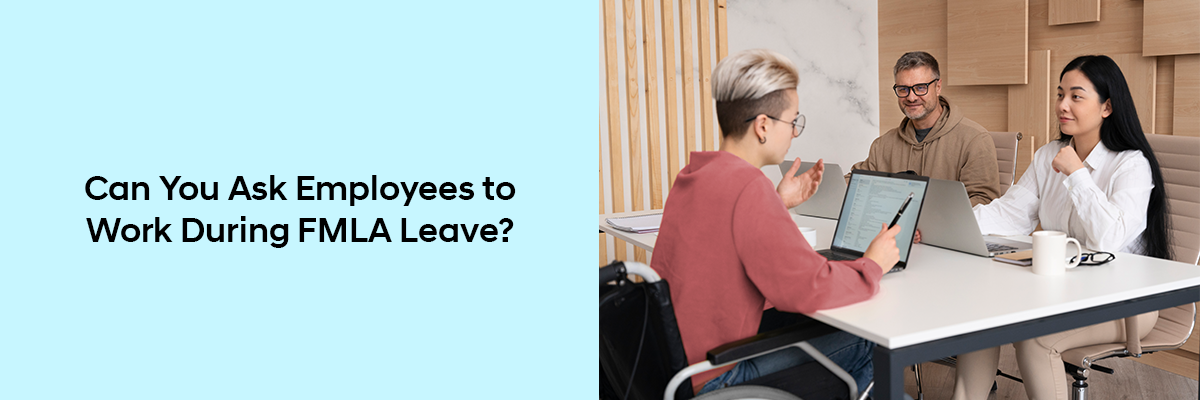When life throws curveballs, a serious illness, a new baby, or a family emergency, work understandably takes a backseat. That’s exactly why the Family and Medical Leave Act (FMLA) exists: to protect employees during these times without making them choose between their job and their personal life.
But what happens if, in the middle of an employee’s FMLA leave, something urgent comes up at work? Can the employer reach out? Can they ask for help? Should they? Let’s unpack this properly.



What Is FMLA Leave? (And Who’s Eligible?)
FMLA is a federal law that allows eligible employees to take up to 12 weeks of unpaid, job-protected leave in a 12-month period. During this time, the employee retains their health benefits and has the legal right to return to their same or equivalent position after the leave.
Who qualifies for FMLA?
To be eligible, an employee must:
- Work for a covered employer (generally, a private employer with 50+ employees, or a public agency).
- Have worked at least 12 months for the employer.
- Have worked at least 1,250 hours over the past 12 months.
- Work at a location where the employer has at least 50 employees within 75 miles.
Why Employees Take FMLA Leave
FMLA isn’t for “taking a break.” It’s for dealing with serious life events. Common reasons include:
- Recovering from a serious medical condition
- Caring for an immediate family member with a health issue
- Parental leave after childbirth, adoption, or foster placement
- Handling qualifying military-related needs or caring for a wounded service member
In most of these cases, employees are physically or emotionally unavailable for work, which is the entire reason the law protects their right to be absent.
To know more about fmla for mental health, do give our in- depth blog a read.
Can Employers Ask Employees to Work During FMLA Leave?
Here’s the legal and ethical reality: Employers cannot require employees to work during FMLA leave. That would violate FMLA protections and could open the employer up to legal consequences. However, and this is a big “however”, there is some nuance.
Understanding “Interference” with FMLA Rights
According to the Department of Labor, employers must not interfere with an employee’s FMLA rights. “Interference” includes:
- Requiring work to be done during leave
- Discouraging the employee from taking leave
- Retaliating against an employee for using leave
- Pressuring an employee to cut their leave short
Even small acts, like repeatedly calling to “check in” or implying a project is falling apart without them, could count as interference, depending on how it’s interpreted.
To know more about whether an Employer Can Deny Intermittent FMLA Leave, do give our in- depth blog a read.
Is Any Contact Allowed at All?
Yes, but it must be handled carefully.
What’s generally okay:
- A brief call or email to ask where a file is stored
- Clarifying a process they were involved in, if no one else can figure it out
- Informing the employee about a company-wide change that might affect them (e.g., reorganization, layoffs, policy updates)
What’s not okay:
- Assigning new tasks
- Requesting status updates on current projects
- Asking them to join meetings, respond to emails, or make decisions
- Creating a sense of obligation to be involved
If the employee voluntarily offers help or expresses willingness to stay in touch, that’s their choice, but it should never be initiated or expected by the employer.
What Employers Should Do Instead
If you’re an employer or HR professional trying to cover someone’s workload during their FMLA absence, here’s the smart move:
- Have a backup plan before they leave – Cross-training is your friend.
- Communicate coverage clearly – Let the team know who’s handling what.
- Respect the boundary – If the employee’s off the grid, keep them off the grid.
- Document everything – Keep clear records of any contact made, in case it’s questioned later.
- Don’t blur the lines – Even if the employee says, “I can help a little,” clarify what that means legally and ethically.
Why It Matters: Legal Risks and Human Decency
FMLA violations can lead to lawsuits, government audits, fines, and serious reputational damage. But beyond that, it’s about trust. If employees don’t feel safe taking leave when they genuinely need it, you’ve failed as a workplace.
Managers who ignore FMLA rules, even informally, create a culture of fear, burnout, and eventual turnover.
Conclusion: Respect the Law, Respect the Leave
FMLA isn’t a suggestion, it’s a legal right designed to protect employees when they’re most vulnerable. Asking someone to work during their protected leave, even for “just a little help,” can cross the line into illegal territory.
Unless it’s an emergency and the employee chooses to help (and is medically able to), employers should stay out of their inbox. The best workplaces plan ahead, respect boundaries, and focus on building trust, not breaking it when it matters most.


